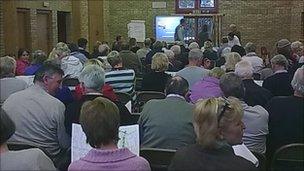Powys super dairy is factory farming, says charity
- Published
A proposed "super dairy" in mid Wales has been criticised as "factory farming" by animal welfare charity Compassion in World Farming (CIWF).
Farmer Fraser Jones plans to build one of the first such parlours in Wales for a herd of 1,000 cattle.
As well as CIWF, people living close to the proposed site are concerned and have called a public meeting.
Mr Jones, who explained that cows would be inside for 250 days of the year, denied it was factory farming.
He claimed the proposed multi-storey parlour in the village of Leighton, near Welshpool, would in fact improve milking conditions.
Compassion in World Farming spokesman Stuart Notholt said: "This is factory farming. These cows will be zero grazed for much of their lives. The animals will not be let out until late lactation and not at all if this happens in winter.
"It looks like the cows will be kept in groups of 300 or more. This is far too large for a proper social unit.
"It sounds similar to the proposal in Lincolnshire, where we are concerned about the sheer numbers, excessive production levels and the lack of grazing."
Critics of the project in Lincolnshire, say the sheer size of this operation - based on similar super dairies in the United States of America - will change the face of dairy farming in the UK as well as posing a real risk to the welfare of the animals.

A public meeting was being held on Wednesday night to discuss the plan
When the CIWF's comments were put to Mr Jones, he said: "Their facts are completely wrong. The cows will not be kept in groups of 300, but in groups of 150 and they will go out for grazing.
"They will be kept in for 250 days of their lactation. For the next 150 they will be out grazing. When inside their health will be monitored all the time. I dispute that this is factory farming."
He added: "The cows will have sheds designed especially for them with a more comfortable floor, natural ventilation and lots of room to lie down.
"They will spend less time in the milking parlour and standing around on concrete and dry cows and late-lactating cows will be outside."
Paul Harris, who has organised a public meeting at Leighton village hall on Wednesday evening, said the earmarked land was unsuitable because it was close to houses and a primary school.
'Environmental issue'
"My particular concern is animal welfare," he added. "We cut out battery hens and battery pigs, so why are we going for a battery unit for cows?
"I'm also concerned about the noise coming from 1,000 cows, and the smell. There's an environmental issue too - more cows means more effluent and more trips to the fields to spread it."
Carmarthenshire dairy farmer and vice-president of the Farmers' Union of Wales, Brian Walters, said some farmers were increasing herds as a result of low milk prices.
"I haven't heard about these plans, but they sound quite unique," he said.
There are about 2,300 dairy herds in Wales producing 1.5bn litres of milk per year.
- Published10 August 2010
- Published17 June 2010